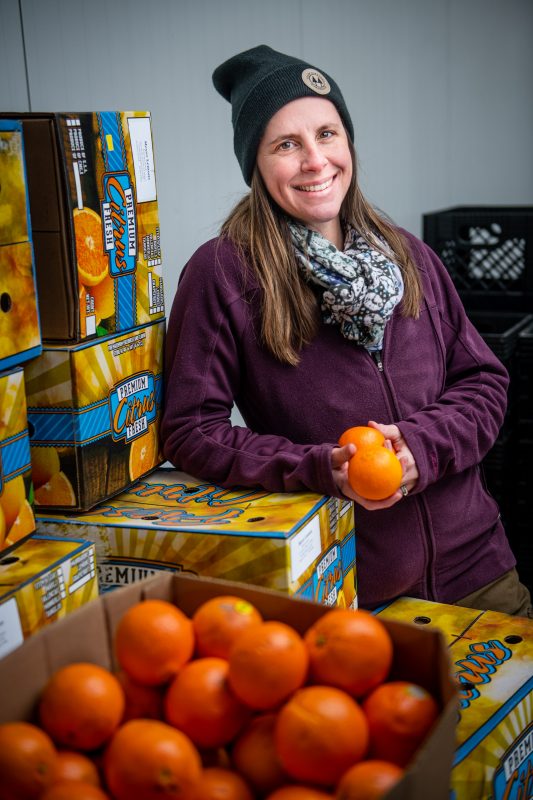By Leigh McCarren, Ownership & Outreach Specialist
Co-op Partners Warehouse is TCCP’s organic and local produce and grocery distributor, located in St. Paul.

You recently got promoted to the Quality Control Sustainability Shift Lead at Co-op Partners Warehouse (CPW). What brought you to this role?
Being the co-founder of Zero Waste Saint Paul, I am especially passionate about reducing food waste. I knew I had to make changes once I had been at CPW a little longer and gotten to know how all the departments worked.
What sustainability initiatives are currently in place at the warehouse?
Recently, I helped CPW get a grant from Biz Recycling through Ramsey County. With the grant, we were able to get a second organics bin with a twice weekly pickup, streamline our rubbish bins and reduce our trash pickup from three days to two. By doing all of this, we are saving around $250 a month. In the future, I hope to reduce the size of our trash dumpster.
I’ve strengthened our relationship with the commissary kitchen, delis, and juice bars at our stores to filter short-dated product, ripped bags of flour and sugar that get taped right away, and blemished produce for immediate use. It excites me to see produce that is not good enough for store shelves get new life in soup, stock or smoothies.
The warehouse has a host of organizations like Sisters’ Camelot, Twin Cities Food Justice, Provision Restaurant, and First Nations Kitchen that “shop” our food bank to get good organic food to people in need. This program has been in place since the beginning of CPW, but now as the sustainability lead, I’m working to deepen those relationships and make sure the product is not wasted and is usable for our partners. In the future, I would love to work with local breweries to get unsaleable fruit made into delicious beverages.
Do you have any tips and tricks for living more sustainably at home?
I always say start simple and do your best. No shame in the zero-waste game.
• Carry a travel coffee mug. If I don’t have my reusable mug, then I don’t get coffee to go, ever.
• Pack a mess kit. I carry my own chopsticks, eating utensils, and a cloth napkin wherever I go. In our family van, we have a “mess kit” containing plates, cups, utensils, and cloth napkins for those unexpected food stops, potlucks, or community meals.
• Bring your reusable bags to carry your goods, produce and grains.
• Shop in bulk. Our co-op stocks eggs, rice, oatmeal, pasta, nuts, snacks, even shampoo and conditioner. We have everything you need with little to no packaging downstream if you bring your own carton or container to refill.
Food is always best eaten, no matter what packaging it comes in. Buy only what you need, avoid waste by sharing what you don’t like with neighbors and friends, and remember that your freezer is your friend. I gather all my vegetable and herb scraps in a bag in the freezer and when it is full, I make stock. I also freeze leftovers for those nights I don’t want to cook.
In the end, many people doing zero waste imperfectly is better than a few doing it perfectly.